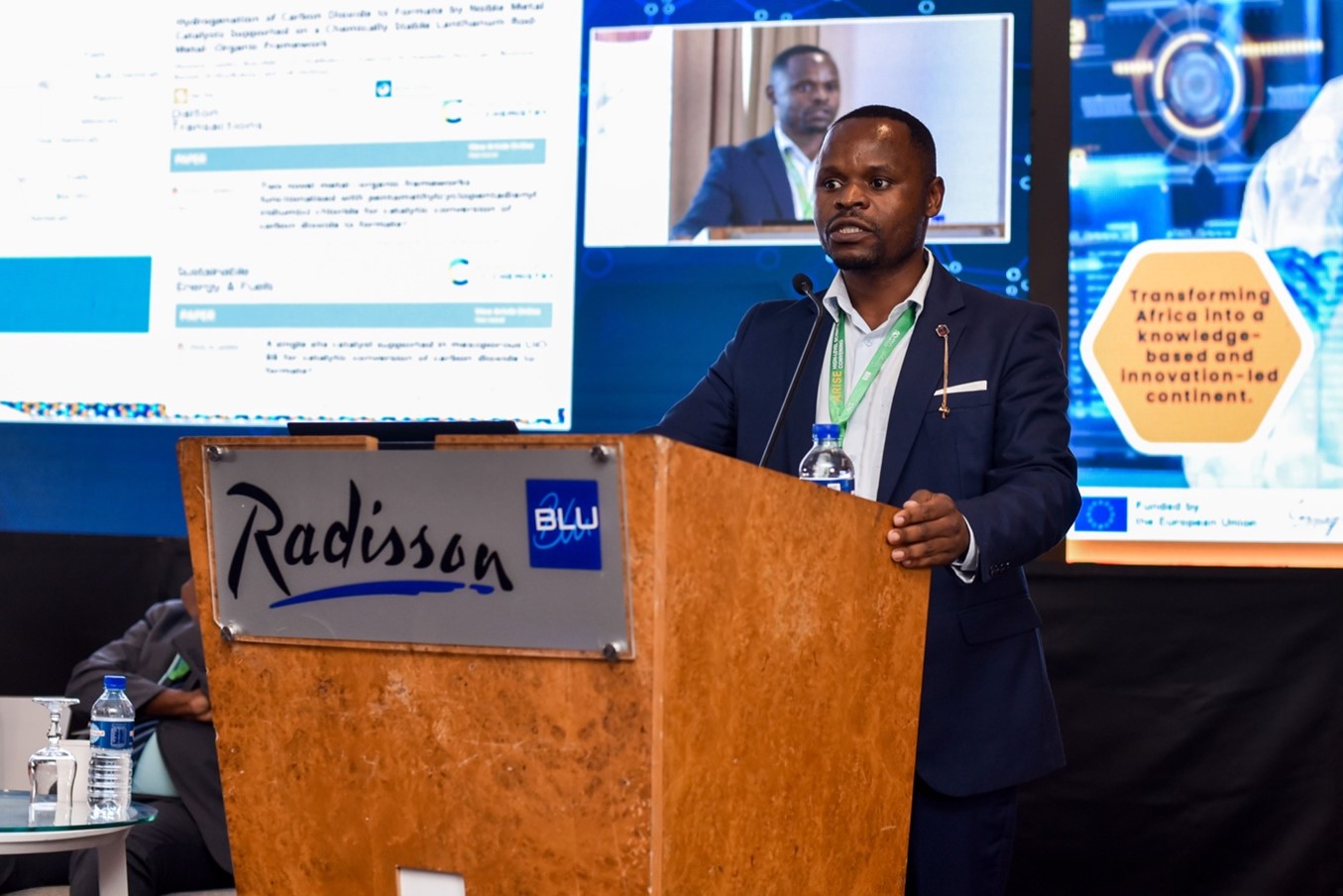News
Pioneering Innovative Carbon Dioxide Utilisation in Africa
In the fight against climate change, Africa is uniquely positioned as both a significant victim and a potential leader in sustainable solutions. Driving this transformative effort is Dr Gift Mehlana, a fellow of the African Research Initiative for Scientific Excellence (ARISE) and a Lecturer in the Department of Chemical Sciences at Midlands State University in Zimbabwe, whose pioneering work on carbon dioxide utilisation could herald a new era of green technology in Africa.
Dr Mehlana’s ARISE research project research project aims to convert carbon dioxide into valuable products like methanol using chemical and biological catalysts. This work seeks to reduce greenhouse gas emissions and tackle critical issues such as energy shortages, climate change and sustainable industrial development in Africa.
Turning carbon dioxide into opportunity
Since starting his innovative research, Dr. Mehlana has focused on improving catalysts that activate carbon dioxide and convert it into formates, which are chemicals widely used in various industries. The introduction of biological catalysts addresses specificity and low energy requirements, making them ideal for sustainable manufacturing practices.
“This ongoing project is crucial for reducing emissions, combating climate change—a pressing issue as Africa is profoundly affected when disasters strike due to limited resources.” Says Dr Mehlana.
The ARISE programme, under which Dr. Mehlana’s current research project is conducted, is an innovative research and innovation (R&I) initiative implemented by the African Academy of Sciences with support from the European Commission, Carnegie Corporation of New York, and the African Union Commission.
Dr. Mehlana’s research focuses on green fuels like methanol, addressing critical issues of energy efficiency and environmental sustainability. By converting carbon dioxide into methanol, the project aims to reduce carbon emissions from industrial activities and provide a clean energy by capturing and converting carbon dioxide to methanol. This approach not only mitigates environmental and health risks associated with carbon emissions but also promises substantial economic benefits. Methanol, as a clean-burning fuel, integrates seamlessly into the infrastructure of emerging economies and could significantly reduce reliance on more polluting energy sources.
Global impacts and sustanable futures
The "methanol economy" is increasingly recognised as crucial for sustainable energy development globally. Methanol can serve as a versatile energy carrier and is heralded for its potential in improving energy storage while reducing carbon footprints. According to the International Energy Agency, transitioning to cleaner fuel alternatives like methanol could help reduce global carbon dioxide emissions, which reached a high of 33 gigatonnes in recent years, highlighting the urgency of such innovations.
ARISE: Catalysing Africa's Development through Research and Innovation

Dr Gift Mehlana gave a presentation on converting carbon dioxide to methanol through novel porous materials at the ARISE High-Level Scientific Convening in Hammamet, Tunisia
In June 2024, the ARISE programme convened over 100 leading scientists, policymakers and thought leaders from across the continent to showcase and discuss opportunities for enhancing investments and partnerships to facilitate research and innovation on the continent. The ARISE high-level scientific convening served as a critical platform for advancing scientific research and innovation across Africa.
Speaking at the high-level scientific convening, Dr Mehlana shared that his project not only aims to reduce carbon dioxide emissions but also to provide energy materials: “Over 60% of the energy produced in Africa is consumed by South Africa alone, highlighting the continent's immense energy demands. By converting carbon dioxide into an energy material, we can address some of Africa's challenges, such as energy shortages.”
Beyond the scientific community, the implications of his research are profound, impacting socio-economic development and environmental conservation. Dr Mehlana’s work is also a testament to the power of international collaboration and local innovation in crafting solutions tailored to Africa’s unique challenges.
Looking forward
As Dr Mehlana continues his research, the impact of his work is expected to grow, providing a scalable model for carbon dioxide utilisation not just in Zimbabwe, but across Africa. His efforts are paving the way for a sustainable future where clean energy and green technologies drive economic growth and environmental resilience.
The ARISE programme has empowered Dr Mehlana to generate crucial interventions for the continent. He stated: “These partnerships are essential for the cross-pollination of ideas and bringing advanced technologies to Africa, developed by Africans for Africa. This ongoing research showcases the continent's potential, and the vast pool of talent dedicated to improving lives through the ARISE programme.”
The African continent, rich in resources and talent, stands at a pivotal moment. With scientists like Dr Mehlana leading the charge, the future looks promising, where indigenous innovation and international cooperation converge to meet the challenges of tomorrow.
Related Articles